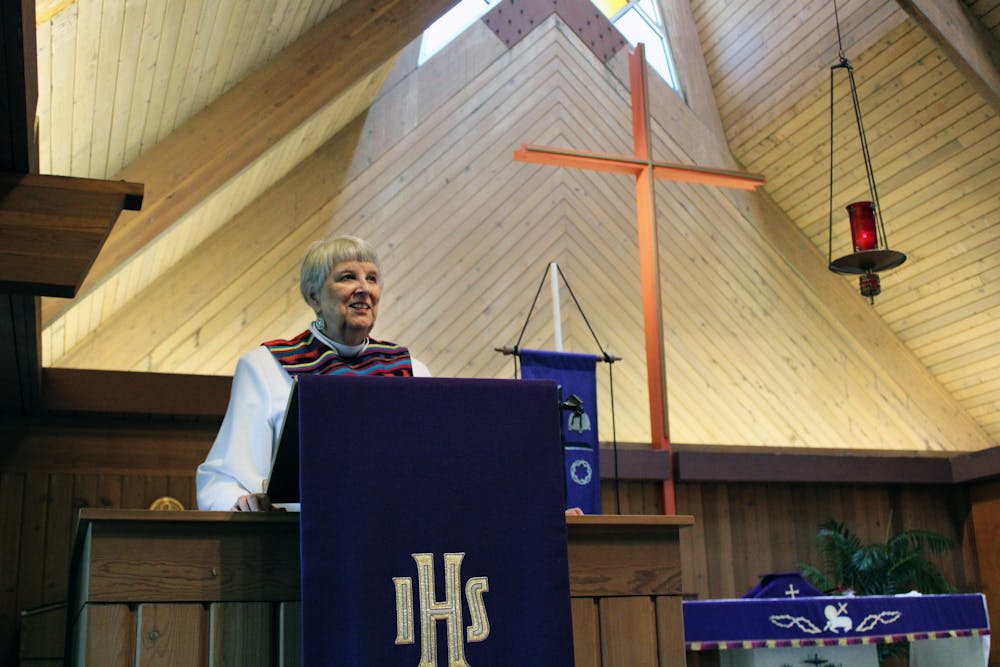Less job opportunities, lower salaries or being labeled “heretic” is nothing new for women who lead Gainesville’s religious congregations. Although the city’s female religious leaders face adversity, they continue to fight for diverse initiatives and new perspectives of their beliefs.
One Protestant Christian minister, Bromleigh McCleneghan, a 43-year-old Gainesville resident who leads the United Church of Gainesville, faced a mix of praise and criticism for her book “Good Christian Sex,” which attempts to transform the way Christians view sex and purity culture.
Some of the comments she received about the book related to being a woman, she said.
“I’d get emails from total strangers at work about ‘how did I not understand XYZ?’,” McCleneghan said. “Mansplaining the Bible to me.”
From 2018 to 2019, only 13.8% of congregations were led by women, and 8.1% of worshippers were in congregations led by women, because they tend to be smaller, according to National Congregations Study surveys. The data comes from surveying churches, synagogues, mosques, temples and other places of worship.
McCleneghan was working as a minister for children and families at the time of her book’s publication, and many people called to have her fired.
“Folks would call the senior pastor and [say], ‘You need to fire her because she's a heretic,’” McCleneghan said. “I think that a lot of that pushback was highly gendered.”
The women who serve in these roles are normally treated with the same respect as their male counterparts. However, many female religious leaders have spoken out about the sexist microaggressions they have faced while working.
And the same is true in Gainesville — three female leaders interviewed by The Alligator who have worked in congregations said they’ve experienced sexist remarks throughout their careers.
McCleneghan grew up in Chicago watching her father serve as a minister in Protestant Christian churches. She was against following in his footsteps, until she attended the University of Chicago and discovered her passion for preaching.
She served in several churches in Illinois before a colleague encouraged her to apply to be a minister at the United Church of Gainesville, where she’s been since 2020.
McCleneghan has typically witnessed women leaders in her denomination treated the same as her male coworkers, but there are incidents she believes only happened because of her gender, she said.
When Brett Kavanaugh was confirmed to the Supreme Court in 2018 after sexual assault allegations against him came to light, McCleneghan led a prayer about sexual assault and the difficulties of watching the government ignore survivors.
Many members of the congregation expressed how inappropriate the prayer was, she said.
“I think if my male colleague had offered the same prayer, it would have been very different things that folks said,” McCleneghan said.
Lynn Fonfara, a 75-year-old resident of Beverly Hills, Florida, is the interim pastor at University Lutheran Church and has noticed struggling churches often have to be open to accepting pastors who aren’t male. Often, congregations have no complaints, she said.
“The best possibility is if you’re open to a woman, or even a person who is gay or lesbian, and they looked at me like, ‘What are you talking about? That doesn’t make any difference to us,’” Fonfara said.
Aside from churches who face financial or attendance problems, Fonfara has heard of instances of sexist hiring practices.
In one situation, Fonfara said there was a man and a woman who were both seeking positions in religious leadership. The woman was invited to be a candidate at a small church, while the man was invited to be a candidate at a larger church with a larger paycheck, she said.
After graduating from Augustana College in Illinois in 1970, Fonfara believed she wasn’t ready to lead a church so she began volunteering in the church, mainly in the women’s organization.
“Being a pastor was something that, for the most part, women were told they couldn't do,” Fonfara said.
In 1997, Fonfara enrolled in seminary and has been serving as a pastor and interim pastor ever since.
In the past at the Evangelical Lutheran Church in America’s annual Churchwide Assembly, Fonfara and other women in attendance would have to put in extra effort to make sure they were recognized as pastors, she said.
“All of us women would wear collars,” she said. “We’d wear clerical shirts to make sure that lay people and male pastors saw us as ordained women.”
Fonfara doesn’t feel the need to follow this practice, as there’s a lot more acceptance than ever before, she said.
Fonfara has overall been accepted by the different congregations she has served, she said, and always been welcomed. There was one instance in a church in which she was respected by half of the congregation, while the other half didn’t feel the same, she said.
“There were other people in the same congregation who were trying to get rid of me because women shouldn’t be ordained,” Fonfara said.
Outside of the Christian faith, religious leaders still face issues.
Gail Swedroe, a 39-year-old resident of Austin, Texas, served as UF Hillel’s assistant director and campus rabbi from 2012 to 2014.
Growing up, Swedroe was surrounded by many Jewish women who made up the clergy or were rabbis, she said.
“I feel privileged that I'm part of a religious movement that does have women clergy,” Swedroe said.
In rabbinical school, Swedroe’s class was half women. She also never directly experienced instances of sexism after leaving school, she said.
In informal capacities, Swedroe has been asked about having children and balancing that with work after interviewing for positions, she said.
“How I would anticipate being able to balance having a family and serving in a professional capacity, which is not something that my male colleagues typically get asked,” Swedroe said.
After working in Gainesville, Swedroe moved to Austin to work after UF Hillel got rid of her position. She has now worked as the associate rabbi at the Congregation Agudas Achim in Austin for the past eight years.
Despite changing standards in different faiths, the female commitment to faith won’t change — whether that’s from the seats of a congregation or a podium at the front.
Contact Claire at cgrunewald@alligator.org. Follow her on Twitter at @grunewaldclaire.

Claire Grunewald is a fourth-year journalism major and the Spring 2024 Editor In Chief of The Alligator. In her free time, she likes to go to concerts and attempt to meet her Goodreads reading goal.






